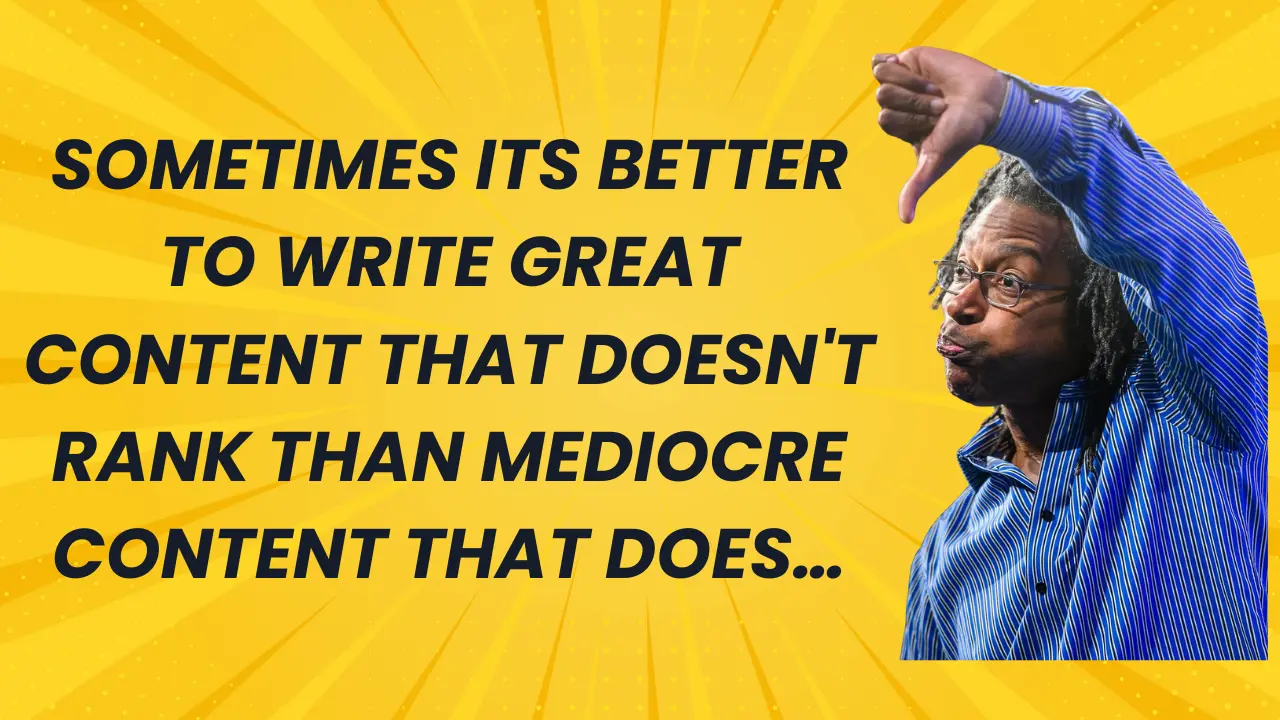In preparation for a panel presentation I was invited to at SXSW titled "we f*cked up. Now What? Exploring failure, together" - with our pals at Happycog and some new pals like Tracey Halvorsen of Fastspot.
As I set down over lunch with the guys and girl above, I started thinking about what I could share, given that my last post on hiring difficulties was well received I figured I'd write something that combines both. It begins with story of one of our biggest clients, who I at one time turned away...
I turned this client away the first time they came to us, I had met with the owner over breakfast. He found us through a search and had done a ton of research on what to ask a potential SEO firm. During our breakfast it became obvious that his expectations for how search worked and what it could contribute to his bottom line were off from how I understood them. So at the end of our conversation, I told him that we wouldn't be able to work on these projects because I didn't honestly feel like I could set realistic expectations. BOY WAS THAT ALMOST a MISTAKE - 2-3 people would not have jobs at SEER if he walked, but instead he didn't...
He called me the next day and said "you were the only guy who wouldn't promise me they could give what I wanted, and instead took time to educate me on what to expect, you tell me what I can expect." As a result, he asked me to come in and set his teams expectation on what search can do, which I did, and sure enough over the course of our 3 year relationship, its been fruitful for both sides, and this company is one of my favorites to look back at how we were able to help - the relationship has grown over the years, and we have had a very honest and smooth working relationship, they challenge us, we challenge them but all for the sake of growing their bottom line. So with that story behind us, lets get started on how to not take on jobs DOOMED for failure from the beginning - and if you do fail how to handle it.
Avoid jobs with unrealistic revenue expectations
Search marketing, social media marketing, conversion optimization, whatever it is that you do, you MUST avoid clients with unrealistic expectations, none of your businesses create miracles. You must also admit to yourself that you don't walk on water, and there's always a chance for failure.
It is part of your job to do the math with your prospective clients to at least give you and them an idea on what a goal you should both be shooting for. In every initial new business conversation, ask the person on the other end of the line for their average sale value and a rough idea on margins. Starting the conversation there allows you to easily do some mental math while determining if the expectations are realistic. Focus on how your client makes money look at the searching universe if things dont match up dont take on the project, because even if you kill it in SEO theyre probably going to have a negative ROI and a negative sentiment about your company.
Want to avoid a major screw up later down the road?? Don't fear letting a prospective client know that the numbers don't add up, and as such they should seek another company.
Sometimes clients will say "dont worry about our profitability, well handle that, you bring the traffic we will worry about how to convert it." Weve had clients say that, and that is 100% fine with us if they end up upside down on ROI later in the project we know we tried to help them avoid that reality in the first place.
Agree on success metrics before contracts are signed
We had a client for whom we increased their traffic 3x (yes they were already getting thousands of visitors) yet in spite of that they werent entirely sure we werent doing all we could to grow their business. I KNEW we were.
This was my fault, I should have done a better job up front of making sure we both were in agreement on what exactly success was. For me success was returning a positive ROI, for them, it was a positive ROI but more important was how many links did we build last week/month.
We ultimately had to let them go because the way they looked at success was obviously different than how we did. I am not saying they were wrong, but just not the right fit for us.
Assuming your upfront due diligence is done and you agree on what success is, and for some reason you just cant get a great ROI at 6 or 9 months in, the first step is to admit to the client that you see that they have an upside down on ROI. Get the elephant in the room on the table immediately. At the very least you'll earn their trust that even in the face of bad news you have the cojones to admit it. See below for some ideas on how to address failure with clients. By getting this issue on the table you give even the nicest clients the ability to now talk openly about the obvious failure. This doesnt make them feel bad for bringing the obvious points up. When your results aren't good you should never have to wait for the client to say something first, NEVER.
Don't show your best hand
Why do you think might not be the best idea to lead in with your best case studies? Prospective clients who ask for a case study may see an example for a site out there you were able to increase traffic by 10x and conversions by 8x and added $500k in gross sales.
Some people when they see those kinds of results think its typical and not an exception, so when you finish the project with a traffic increase of 80% and conversion increase by 55% with $180k in additional gross sales, that might feel like a disappointment to them. If this happens, it is your fault.
You got the biz by showing your client your best case scenario of all time, setting their expectation that these results are not always typical is one way you can address this. Personally I'd prefer to show a prospective client the best, middle, worst case scenarios giving them a more balanced view of how SEO can work for them and outline why (if possible) those results happened.
Remove "magic server pixie dust" thinking in SEO
Remember this commercial from IBM? It's time for clients to wise up to the fact that crappy links typically ain't gonna get you that leg up on your competitors, we should be the people pushing that message. This means in the sales process you should be educating your client that you are going to need them, A LOT to be successful in building high quality links. You are going to need budgets, access to project managers, give-a-ways, etc.
No project sucks more than the one where the client just thought they'd pay you, you'd sprinkle some dust and then they'd wake up with money coming out the whazoo. Ok, so now that you've done all the work to set the clients expectations, congratulations. The real sad question is what happens when you do all the hard work spending night and day optimizing, link building, and the results never come?
Typically there are a few reasons why ROI can be in the pits - here's the three most typical scenarios and how we deal with them at SEER.
If the ROI sucks because the client is slow
Solution cut their monthly payments up to half (unless you bill hourly) most clients know when they are the cause for the slowdown in results. But if their slow down is preventing you from doing a large part of what you need to do to help them be successful, its a good idea to cut their monthly payments, especially since you have less work to do and parts of your project are in a holding pattern. It may not be half, but you should show some kind of sign that says I am not comfortable billing you for work I am probably not doing.
If you dont take this approach, youll likely keep billing them and they may keep paying, UNTIL someone asks what we are getting for this, which is not a good conversation to have once you've been put in defensive mode. Taking an "F you pay me" approach to a slow client is a guaranteed way to get the boot.
If the ROI sucks because you are unable to get rankings
This happens, SEOs hate to admit it, but good ones aren't and we're no exception, yes at times SEER has not gotten the results I hoped for in the timeframe I hoped and sometimes it was not the clients fault. We may have just needed more time than expected at the onset of the project.
I strongly believe in the Vince Lombardi quote that goes something like this:
"We didnt lose, we just ran out of time"

That's my mantra. Personally I feel like I rarely lose because I'll never give up, that does require patience on the part of your client. Again if you've done a great job of setting expectations up front and being honest, you'll have explained to them that results come at different stages, so they should be expecting that late results is always a risk you take with SEO.
Any SEO that says they bat 1.000 and have never had a job that at times looked like a failure is probably not challenging themselves with difficult projects or they are just not being honest.
This has happened to me maybe 10 times in my SEO career. In every instance I proactively called the client, and said just this:
"When we sat down at the table and shook hands, you knew that I couldn't guarantee rankings or results, yet you trusted us in the goal of helping you grow your traffic and leads through search. While we have some small victories to point to we are not at the level that both you and I expected. As a result we are going to halt your payments for 2-4 months (depending on how far away we are) while we are still working 100% full steam ahead on your project. Assuming we get the rankings (and I believe we will) we can make up the payments on the end when you can see a tangible impact.
Clients are shocked when I make these calls, but it is just the right thing to do. That is how Id want to be treated, and you would too.
If the ROI sucks due to less search volume / tighter margins
This is one of those things you as an SEO cant do a whole lot about, but to maybe stretch out your payments for a month or two as a sign of client solidarity, letting your client know that you know they are getting the squeeze and that you are in this with them as a long term partner.
Good clients dont abuse this, so make it your job to find the GOOD clients. GOOD clients also know that there is nothing you, as an SEO can do if less people search for their target keywords or if they have to cut prices, thus throwing off your ROI projections.
If the project sucks because theres communication problems
So this is again your fault, unless you can point back to documented instances of you setting a clients expectation over and over again. Every time I've seen a major communications "F Up" at SEER I took responsibility for it, and our team does too. As such we are constantly working on process improvement, with the idea being that every time a client has an expectation we didn't fulfill that its either our fault for not communicating or its MY FAULT for bringing in a client who I didn't work on setting expectations with properly. Once we own the problem we own the solution - and that's what we do, look back at the communication failure and figure out how can our processes be improved. If the process can not be improved then we know that we need to chat with the client about why they were wrong, if the process can be improved we let the client know that they have exposed an area of weakness in how we manage projects / communicate and let them know when they can expect to see an improvement.
SEO is an unpredictable business, we all know that, and I think that even clients (the good ones at least) are starting to realize that too. Good clients are not breaking backs in 2 months asking where's my top ranking anymore.
Maybe I took the long way to just saying, just follow the rule you learned in the sandbox at age 5, treat others the way you want to be treated, and when tough business decisions arise youll always make the right decision.
Admittedly most of this post revolves around ROI & Communication but there are several things I didn't have time to go into like retention, having a great team, firing bad clients, etc that also help lead to SEO success.
I hope these tips help you avoid SEO failure from the get go, and for more on how to avoid colossal F Up's - come see our session at SXSW.


